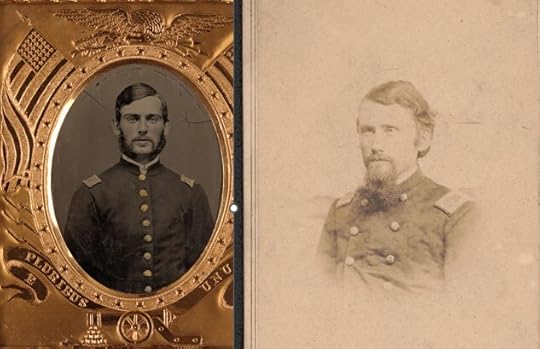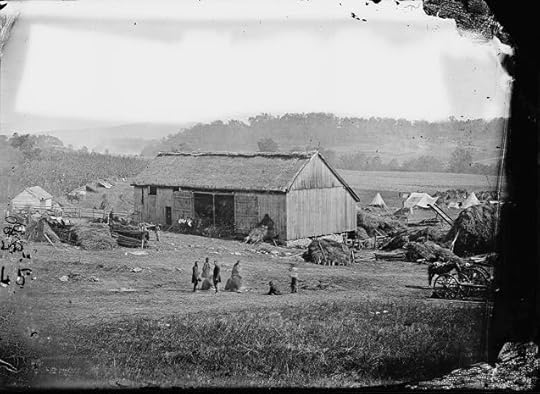Hard Bread and Coffee Our Only Food, Blankets Our Only Shelter: The First March of the 20th Maine
In September 1862, the new recruits of the 20thMaine endured their first wartime march during the Maryland Campaign and “ahard one it was” remembered Sergeant Edward Simonton.
“We marched our march lastFriday and hard one it was, at the rate of 20 miles a day, under a scorchingsun, loaded down with gun, ammunition, rations and blankets- leaving ourknapsacks behind,” he wrote. “Hard bread and coffee was our only food-blanketsour only shelter at night. The old regiments said it was the hardest march theyever had. I felt ready to drop once or twice, but the idea that we were inpursuit of old Stonewall nerved me up to new effort and urged me onward.”
The 20thMaine, mustered into service on August 29, 1862, at Camp Mason, near Portland,Maine, had sailed from Boston to Alexandria, Virginia aboard the steamer Merrimackalong with the 36th Massachusetts. Upon arrival on September 6, theregiment camped at the Washington Arsenal, received weapons, and on the 11thwere assigned to General Daniel Butterfield’s brigade, Morrell’s Division, ofthe 5th Army Corps
Sergeant Simonton’sdescription of the 20th Maine’s first wartime march first sawpublication in the October 1, 1862, edition of the Bangor Daily Whig andCourier.
 Sergeant Simonton's comrades during the first march of the 20th Maine included two men familiar to readers who have watched the movie Gettysburg: Sergeant Thomas Chamberlain, Colonel Joshua Lawrence Chamberlain's younger brother, at left was then in Co. I while Captain Ellis Spear on the right commanded Simonton's Co. G. Both men would be promoted to field grade by the end of the war: Spear became the colonel while Chamberlain became lieutenant colonel.
Sergeant Simonton's comrades during the first march of the 20th Maine included two men familiar to readers who have watched the movie Gettysburg: Sergeant Thomas Chamberlain, Colonel Joshua Lawrence Chamberlain's younger brother, at left was then in Co. I while Captain Ellis Spear on the right commanded Simonton's Co. G. Both men would be promoted to field grade by the end of the war: Spear became the colonel while Chamberlain became lieutenant colonel. Near Keedysville, Maryland
September 18, 1862
We leftWashington for Arlington Heights, about two miles into Virginia, a week agolast Monday. There our regiment was immediately attached to General Fitz JohnPorter’s corps (V), Morell’s Division, and General Dan Butterfield’s brigade.Ours is the only Maine regiment in the brigade; the others are New York andMichigan regiments.
Soon after wearrived at Arlington Heights, Porter’s corps was ordered to cross over intoMaryland to join McClellan in pursuit of Stonewall Jackson. We marched ourmarch last Friday [September 12] and hard one it was, at the rate of 20 miles aday, under a scorching sun, loaded down with gun, ammunition, rations andblankets- leaving our knapsacks behind. Hard bread and coffee was our only food-blanketsour only shelter at night. The old regiments said it was the hardest march theyever had. I felt ready to drop once or twice, but the idea that we were inpursuit of old Stonewall nerved me up to new effort and urged me onward. Many,however, fell out by the way.
We passedthrough the city of Frederick, a place I think about as large as Bangor. Herewe saw sad indications of Rebel raids- bridges destroyed, camps deserted, andgeneral ruin all around. Our march was through a beautiful region of thecountry. Day before yesterday we passed through Middletown, the scene of the latefight, and there saw many prisoners as well as arms, clothing, and heaps ofslain, scattered along the road, all proclaiming the horrors of war.
 The Smith Farm near Keedysville was used as a hospital after the Battle of Antietam. This image was taken by Alexander Gardner soon after the battle.
The Smith Farm near Keedysville was used as a hospital after the Battle of Antietam. This image was taken by Alexander Gardner soon after the battle. Yesterday wearrived here near the village of Keedysville which is about five miles from thePotomac and nine from Harper’s Ferry. There was a terrific engagement all day,a constant roar of artillery-bang! Bang! A continuous rushing to and fro oftroops, artillery, cavalry, and infantry. Our corps acted as reserves, beingdrawn up in line of battle all day ready and expecting every moment to becalled into action. Shot and shell went whizzing over our heads and falling allaround us but doing no other injury to our division than to cause some of us tobend our necks and shrug our shoulders slightly. But towards night, our brigadehad orders to hasten to the right; we started on the double quick and expectedan engagement but had none for the enemy had appeared there in force and onseeing us, skedaddled.
We have atremendous force here and hope to be able to bag the entire Rebel force. Wouldto God that we might. Wouldn’t it be glorious? General McClellan is verypopular here. Just now he rode by our lines and was very heartily cheered as heis wherever he goes. He raised his cap and bowed his acknowledgements. He isundoubtedly the man; if let alone, he will, I believe, lead us on to finalvictory.
Sergeant Simonton would enjoy a long and activeservice during the Civil War, but only a small portion of it was spent with the20th Maine. After being commissioned as second lieutenant in January1863, he resigned scarcely two months later. However, in July 1863, he accepteda commission as second lieutenant in Co. I of the 1st U.S. ColoredTroops and would serve with that regiment until mustered out on September 29, 1865,as a captain. He was severely wounded in the left thigh on June 15, 1864,during the first battle of Petersburg and spent several months recuperatingfrom this wound. He received two brevet promotions, to major and lieutenantcolonel for “gallant conduct before Petersburg and for general good conduct andmeritorious service.” He would join the army a third time in February 1866,serving until September 1870 with the 4th U.S. Infantry.
Source:
Letter from Sergeant Edward D. Simonton, Co. G, 20thMaine Volunteer Infantry, Bangor Daily Whig and Courier (Maine), October1, 1862, pg. 2
Daniel A. Masters's Blog
- Daniel A. Masters's profile
- 1 follower



